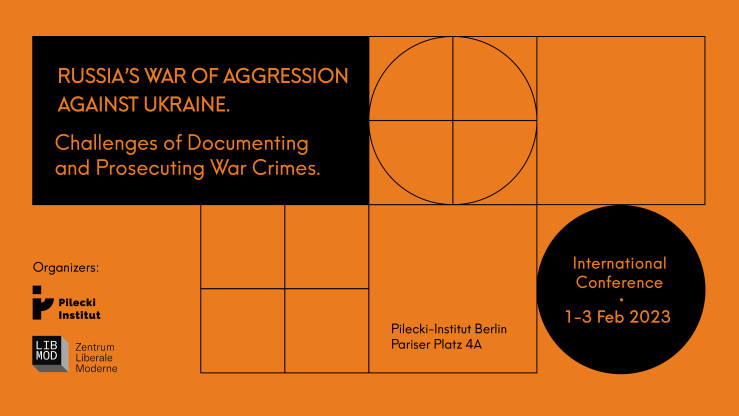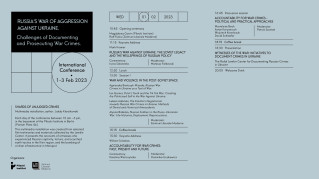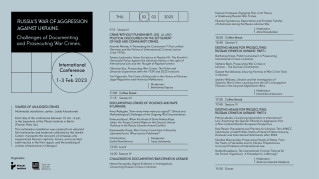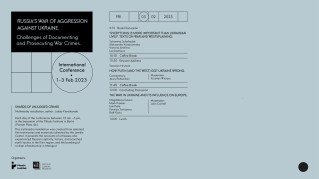Russia’s War of Aggression Against Ukraine. Challenges of Documenting and Prosecuting War Crimes | International Conference - Instytut Pileckiego
conference
01.02.2023 (Wed) 10:45
Russia’s War of Aggression Against Ukraine. Challenges of Documenting and Prosecuting War Crimes | International Conference
Join us and an impressive line-up to reflect on Russia's Invasion of Ukraine and its implications for international law.

"Russia's War of Aggression Against Ukraine. Challenges of Prosecuting and Documenting War Crimes"
International Conference
Organizers: Pilecki Institute in cooperation with Zentrum Liberale Moderne
1-3 February 2023 | Pariser Platz 4A, 10117 Berlin | Register here: https://forms.gle/PiXqzHpowFZgnJLeA
The full agenda is available here
follow conference on zoom: https://zoom.us/webinar/register/WN_2jQZbAI4Qpypv4zmQmGdKA
By its very scope and nature, the war against Ukraine - the largest armed conflict in Europe since WWII - challenges our thinking about international order, war, freedom, post-war justice, and the role of eye witnesses. The conference approaches the war and its consequences from historical and legal perspectives and invites interdisciplinary debate on the nature of the war, the best responses to Russian war crimes, and how to effectively prepare for the challenges of post-war justice.
The assumptions of the war crimes settlement model, adopted in 1945 by the Allied States, and the problem of differing experiences and memories of WWII in Eastern and Western Europe will be a point of departure. Analyzing the development of international criminal law after 1945, we will discuss the factors determining the effectiveness of international justice, focusing on the available means of national and international law to pursue criminal accountability for Russian crimes in Ukraine.
We will furthermore present initiatives to collect evidence and witness accounts of Russian aggression, which have the value of historical testimony as well as of evidence for future post-war trials. The atrocities which these witnesses have experienced from the Russian invasion is the newest phase in a long history of violence that has shaped the history of East-Central Europe through the 20th century. The conference aims to investigate the causes of this violence, its impact on the region and ways to bring it to an end.
A further task of this conference is to shed light on differing historical narratives, perceptions and political approaches in Eastern and Western Europe. Renowned scholars, civil society activists and policy analysts from Ukraine, Germany, Poland, the US and the UK, among others, will have the opportunity to discuss different perspectives on how to approach the war and the crimes committed by Russia, how to address the issues they raise, and how to shape a more robust international justice in the future.
Program
See also
- CALL FOR PAPERS: Oppositional Engagement of Women in Authoritarian and Totalitarian Systems of the 20th Century: Poland in a Comparative European Perspective (1919–1989)
conference
CALL FOR PAPERS: Oppositional Engagement of Women in Authoritarian and Totalitarian Systems of the 20th Century: Poland in a Comparative European Perspective (1919–1989)
We invite scholars to participate in an international academic conference devoted to various forms of activity undertaken by women who engaged in opposition and dissent under authoritarian and totalitarian rule in the 20th century.
- Steve Crawshaw at the Pilecki Institute in Berlin! | Accompanying Event: “Unknown Legacies of the Nuremberg.”
Event
Steve Crawshaw at the Pilecki Institute in Berlin! | Accompanying Event: “Unknown Legacies of the Nuremberg.”
Join us a special event accompanying our two-day international conference “Unknown Legacies of the Nuremberg Trial: Regional Approaches and Perspectives in East Central Europe.”
- Conference: Unknown Legacies of the Nuremberg Trial: Regional Approaches and Perspectives in East Central Europe
conference
Conference: Unknown Legacies of the Nuremberg Trial: Regional Approaches and Perspectives in East Central Europe
We are pleased to invite you to participate in the academic conference "Unknown Legacies of the Nuremberg Trial: Regional Approaches and Perspectives in East Central Europe".


